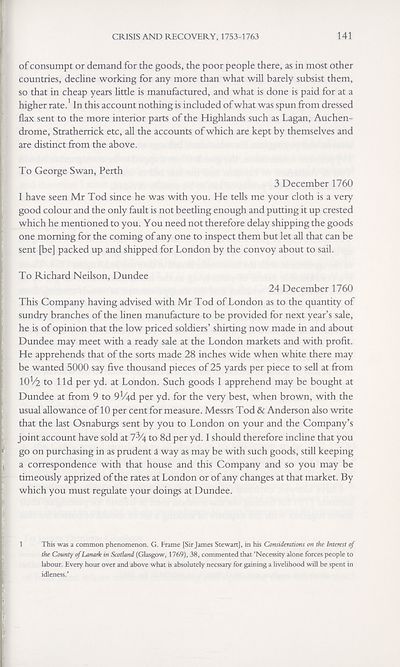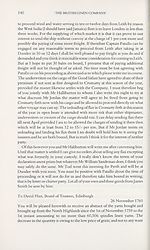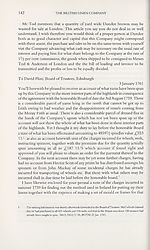Series 5 > British Linen Company, 1745-1775
(158) Page 141
Download files
Complete book:
Individual page:
Thumbnail gallery: Grid view | List view

CRISIS AND RECOVERY, 1753-1763
141
of consumpt or demand for the goods, the poor people there, as in most other
countries, decline working for any more than what will barely subsist them,
so that in cheap years little is manufactured, and what is done is paid for at a
higher rate.1 In this account nothing is included of what was spun from dressed
flax sent to the more interior parts of the Highlands such as Lagan, Auchen-
drome, Stratherrick etc, all the accounts of which are kept by themselves and
are distinct from the above.
To George Swan, Perth
3 December 1760
I have seen Mr Tod since he was with you. He tells me your cloth is a very
good colour and the only fault is not beetling enough and putting it up crested
which he mentioned to you. You need not therefore delay shipping the goods
one morning for the coming of any one to inspect them but let all that can be
sent [be] packed up and shipped for London by the convoy about to sail.
To Richard Neilson, Dundee
24 December 1760
This Company having advised with Mr Tod of London as to the quantity of
sundry branches of the linen manufacture to be provided for next year’s sale,
he is of opinion that the low priced soldiers’ shirting now made in and about
Dundee may meet with a ready sale at the London markets and with profit.
He apprehends that of the sorts made 28 inches wide when white there may
be wanted 5000 say five thousand pieces of 25 yards per piece to sell at from
IOV2 to lid per yd. at London. Such goods I apprehend may be bought at
Dundee at from 9 to QV^d per yd. for the very best, when brown, with the
usual allowance of 10 per cent for measure. Messrs Tod & Anderson also write
that the last Osnaburgs sent by you to London on your and the Company’s
joint account have sold at 73/4 to 8d per yd. I should therefore incline that you
go on purchasing in as prudent a way as may be with such goods, still keeping
a correspondence with that house and this Company and so you may be
timeously apprized of the rates at London or of any changes at that market. By
which you must regulate your doings at Dundee.
1 This was a common phenomenon. G. Frame [Sir James Stewart], in his Considerations on the Interest of
the County of Lanark in Scotland (Glasgow, 1769), 38, commented that ‘Necessity alone forces people to
labour. Every hour over and above what is absolutely necssaty for gaining a livelihood will be spent in
idleness.’
141
of consumpt or demand for the goods, the poor people there, as in most other
countries, decline working for any more than what will barely subsist them,
so that in cheap years little is manufactured, and what is done is paid for at a
higher rate.1 In this account nothing is included of what was spun from dressed
flax sent to the more interior parts of the Highlands such as Lagan, Auchen-
drome, Stratherrick etc, all the accounts of which are kept by themselves and
are distinct from the above.
To George Swan, Perth
3 December 1760
I have seen Mr Tod since he was with you. He tells me your cloth is a very
good colour and the only fault is not beetling enough and putting it up crested
which he mentioned to you. You need not therefore delay shipping the goods
one morning for the coming of any one to inspect them but let all that can be
sent [be] packed up and shipped for London by the convoy about to sail.
To Richard Neilson, Dundee
24 December 1760
This Company having advised with Mr Tod of London as to the quantity of
sundry branches of the linen manufacture to be provided for next year’s sale,
he is of opinion that the low priced soldiers’ shirting now made in and about
Dundee may meet with a ready sale at the London markets and with profit.
He apprehends that of the sorts made 28 inches wide when white there may
be wanted 5000 say five thousand pieces of 25 yards per piece to sell at from
IOV2 to lid per yd. at London. Such goods I apprehend may be bought at
Dundee at from 9 to QV^d per yd. for the very best, when brown, with the
usual allowance of 10 per cent for measure. Messrs Tod & Anderson also write
that the last Osnaburgs sent by you to London on your and the Company’s
joint account have sold at 73/4 to 8d per yd. I should therefore incline that you
go on purchasing in as prudent a way as may be with such goods, still keeping
a correspondence with that house and this Company and so you may be
timeously apprized of the rates at London or of any changes at that market. By
which you must regulate your doings at Dundee.
1 This was a common phenomenon. G. Frame [Sir James Stewart], in his Considerations on the Interest of
the County of Lanark in Scotland (Glasgow, 1769), 38, commented that ‘Necessity alone forces people to
labour. Every hour over and above what is absolutely necssaty for gaining a livelihood will be spent in
idleness.’
Set display mode to:
![]() Universal Viewer |
Universal Viewer | ![]() Mirador |
Large image | Transcription
Mirador |
Large image | Transcription
Images and transcriptions on this page, including medium image downloads, may be used under the Creative Commons Attribution 4.0 International Licence unless otherwise stated. ![]()
| Scottish History Society volumes > Series 5 > British Linen Company, 1745-1775 > (158) Page 141 |
|---|
| Permanent URL | https://digital.nls.uk/127332945 |
|---|
| Description | Over 180 volumes, published by the Scottish History Society, containing original sources on Scotland's history and people. With a wide range of subjects, the books collectively cover all periods from the 12th to 20th centuries, and reflect changing trends in Scottish history. Sources are accompanied by scholarly interpretation, references and bibliographies. Volumes are usually published annually, and more digitised volumes will be added as they become available. |
|---|


